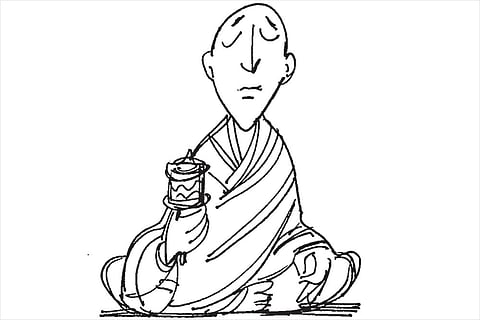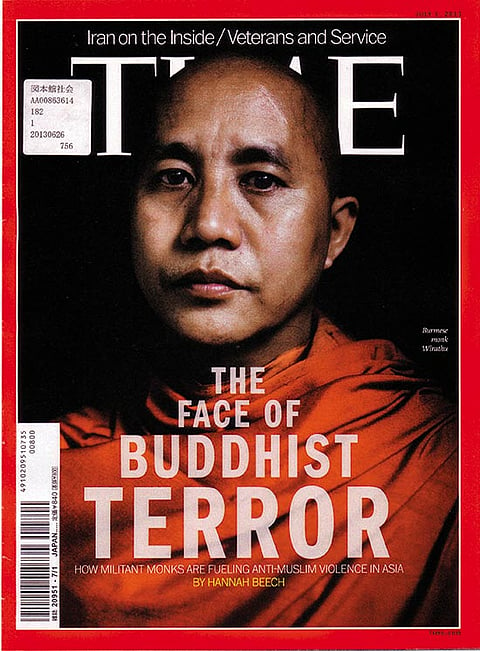These days, when I wake up in the morning and start my meditation, I often wonder how many people have been killed and how many children have starved to death while I peacefully slept. Violence in the name of religion is unthinkable. The 20th century was an era of violence that resulted from lack of far-sightedness—giving in to destructive emotions, and lack of moral principles. This was made worse by a belief in the use of force to solve problems.
Inner Peace Vital
India’s long-standing tradition of ahimsa must continue forever. Otherwise the 21st century can turn out to be bloodier than any.
We have to stop and think—if we go on like this, the 21st century will be an era of violence and suffering like the century that went before. For someone who is 82 years old like me, there isn’t much to worry about, but those who belong to the younger generation today need to question whether this is what they want. Much of the suffering we face is of our own making. We have to ask how we can reduce and counter the problems we have created.
Wherever I go, I remind people of the oneness of humanity, this is the essential message of all the major religious traditions. Religion is wonderful. All our religious traditions carry a message of love and a need for inner peace. But religion itself has now become a factor in causing divisions among people—leading even to killing. It’s unthinkable, a clear lack of moral principles.

The basis of moral principles is to have a real concern for the well-being of others and an appreciation of the oneness of humanity. Whether science or religion is constructive or destructive depends on our motivation and whether we are guided by moral principles. In the past, ethics were the province of religion. But now out of seven billion human beings more than one billion declare they have no faith. Even among those who claim to have faith, there are many who lack conviction. Then there are troublemakers who seek to make mischief in almost all religious groups. This is why it is important today to promote a code of secular ethics that can have universal appeal irrespective of whether we support this or that religion. Differences that exist between us, such as faith, race or nationality are secondary in comparison to the fact that we are the same as being human and that we all have the potential to be compassionate.
India’s longstanding tradition of ahimsa is not based on fear, but on confidence and compassion. An example is the way religious harmony flourishes in this country. Indigenous faiths like Hinduism, Jainism, Buddhism and Sikhism thrive, but the fact that religions from elsewhere also flourish alongside them indicates real tolerance and mutual respect. Zoroastrianism came from Persia. There are some 100,000 of Parsi community in Mumbai and yet they live without fear—this is India. Likewise, Jews came and created a community in Kochi. Christians and Muslims came too. Of course occasional problems crop up, but in general, India is the only country in the world where all major religions live together in harmony and mutual respect.
The traditional Indian understanding of the word secular means having unbiased respect for all religions, as well as respect for the views of non-believers. This is a wonderful, realistic approach to religion. It is reflected in India’s secular Constitution. According to Indian understanding, the word secular does not mean disrespect for any religion. This Indian tradition that appreciates secular ethics is very relevant in today’s world.

A terrorist anyway has no religion
These days, whenever a terrorist attack takes place there is a tendency in the media to attribute it to ‘Muslim terrorists’. Similarly, after Buddhist monks in Myanmar harassed Muslims there, Time magazine ran a cover with a photograph of one of them and the caption ‘Buddhist terrorist’. I feel that using such labels is a mistake because a terrorist is just a terrorist. Once someone embarks on acts of terrorism their actions are no longer true to their religion. When those monks in Myanmar began to terrorise Muslims, they were no longer behaving as proper monks. When they found themselves filled with anger and hostility, I appealed to them to stop, to remember the face of the Buddha. I am convinced had the Buddha been there today, he would offer those Muslims protection. Similarly, Muslim friends have told me that someone who initiates bloodshed is no longer a proper Muslim since Muslims are exhorted to cherish all the creatures of Allah.
We may say prayers when we are trying to solve the problems we face, but I often point out that if we had the opportunity to meet the Buddha, Jesus Christ, Muhammad or Mahavira and ask them to bring peace to this planet, they might reasonably ask, “Who created these problems? Who stirred up this violence? Religious hatred is not created by God, but by you human beings. So it is up to you to put an end to violence and bring about peace.” Creating peace is our responsibility. To pray for peace while still engaging in the causes that give rise to violence is contradictory.
India is a very religious-minded nation, but for most people today religion is just rituals and prayers. Prayer is well and good as far as personal practice is concerned, but when it comes to changing the world, people have been praying for that for centuries to little effect. What will bring about change is education. The real meaning of religion is being able to transform our minds. That will only come about if we use our intelligence. And in order to do that we must have a better understanding of how to tackle our destructive emotions. We can change—we don’t have to give in to anger and hatred. Since compassion and anger cannot coexist, the more we cultivate compassion the more our anger will be reduced. Other animals seem to have a capacity for some sense of compassion, but they lack the intelligence we human beings possess to cultivate and develop it.
Love and compassion bring peace of mind and if we have that we won’t be deflected when negative events occur. A Christian monk I met in Montserrat, Spain, spent five years as a hermit in the mountains living only on bread and tea. I asked him what he practised and he told me he meditated on love. And as he said that I could see from the sparkle in his eyes that he experienced the real, deep and lasting happiness of peace of mind.
Nowadays, whenever I can I tell Indians that you already have a thorough understanding of our inner world and the workings of our mind and emotions. However, in pursuit of material goals, many people neglect this ancient knowledge. One of my commitments is to encourage its revival here in India. I believe that India is a country where it is possible to combine the benefits of a modern education with the benefits of this ancient understanding of the mind. What’s more, I believe that this is something India, the world’s greatest democracy, can contribute to the wider world. If we are to succeed, we have to make an effort and we have to start now.